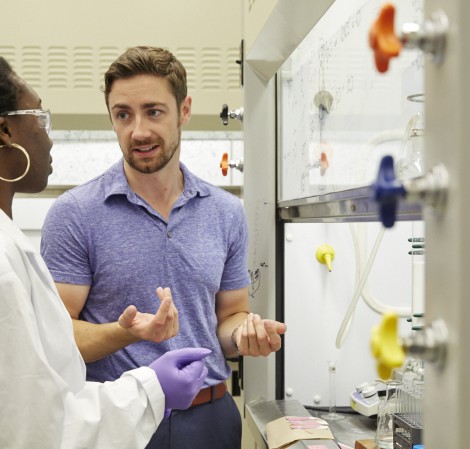The laboratory of Dr. Patrick Gunning at UTM has received a $7 million dollar donation from the Mississauga-based Orlando Corporation. This donation will fund a new Centre for Medicinal Chemistry in the Department of Chemical & Physical Sciences at UTM.
Orlando Corporation’s philanthropy will pioneer medical advancements in cancer therapeutics that Gunning and his team specialize in. Gunning, along with four new principal investigators will be the core team of the centre, which will focus on cancer biology, computational chemistry, medicinal chemistry and stem cell biology.
Gunning is a native of Scotland and grew up on the island of Bute. He received his Bachelor of Science and PhD in Chemistry at the University of Glasgow and went on to do post-graduate work at Yale in 2005, leading his career path to medicinal chemistry. In 2007, Gunning accepted an assistant professorship at the Department of Chemistry at UTM in 2007. There, he developed a medicinal program focused on protein-protein interactions, specifically the interactions involved in cancer cells.
Gunning’s research specifically focuses on creating molecules or inhibitors to target protein-protein interactions found in cancerous cells. Proteins called ‘signal transducers and activators of transcription’ (STATs), like STAT3 and STAT5, carry genes that have been associated with some of the deadliest cancers. These cancers include brain cancer, breast cancer, leukemia, prostate cancer, and multiple myeloma, the cancer of white blood cells.
STAT3 and STAT5 are key proteins for cell growth and cell survival. When the proteins attach to a healthy cell, they bind to the cell to help it grow, then they switch off and disconnect from it. The proteins on a malignant cell, however, latch onto the cell but do not turn off, therefore, making the cell expand until it becomes a tumor.
What Gunning and his team have done is create small molecules that bind to these targeted proteins and knock them out, causing the cancer cells to die. STAT3 and STAT5 are also proteins that are drug resistant, and if those are targeted, then the cancer cell itself can be terminated. This chemical process targets cancerous cells, while maintaining healthy cell production.
Gunning has succeeded in eliminating cancerous tumours in leukemia mice models with his molecule.
The new centre will help further research about these molecules, in hopes that they can one day be produced into drugs. Gunning hopes that with the additional faculty added to this facility, new molecules can be generated for pre-clinical candidate drugs. He also notes that the new centre places special importance on medicinal chemistry — specifically the molecules that target human disease — for the clinical development path.
Four of the molecules Gunning researched have been licensed for advanced pre-clinical trials and one molecule for advanced clinical trial. If Gunning can move the developed drugs past clinical trials, the drugs will only target the cancerous cells, while maintaining low generalized toxicity. This could change existing cancer treatments and decrease the use of highly toxic treatments, like other chemotherapies or radiation.
Chemotherapy kills not only the cancerous cells but other healthy cells. As a result, the immune system of the patient becomes significantly weaker, thus creating a likely chance that the patient will die due to an infection. A new treatment could improve the life expectancy of cancer patients greatly.
Gunning’s research has earned him many awards, including the 2013 University of Toronto Inventor of the Year and U of T’s 2015 McLean Award, and he was listed on the Toronto Star’s “13 People to Watch in 2013.”
Gunning’s research in cancer therapeutics will also create conversation among other academic societies and universities. “The Centre for Medicinal Chemistry will be a locus for interactions of multiple departments across UTM, U of T and with other institutions in Canada and the USA. It will result in [the] formation of a cluster of researchers that will be appointed to provide breadth and depth to the core team, new academic programs, new science infrastructure and a significant expansion of graduate student activity at UTM,” remarks Dr. Ulrich Krull, Principal of UTM and Professor of Analytical Chemistry, Biological and Bioanalytical Chemistry.
Gunning can expand his research team to graduate students with an interest in medicinal chemistry. With other schools working together on the foundation of Gunning’s research, scientists will be able to build strong and rescourceful research teams to advance these molecules to clinical trials.
“I believe that the establishment of the new Centre for Medicinal Chemistry will provide an ideal collaborative research environment in which break through discoveries will be made against unmet clinical challenges,” said Dr. Fettah Erdogan, one of the graduate students Gunning has worked with at UTM. Gunning and his team continue to meet and surpass medical expectations, in hopes of providing insight into deadly diseases.
Thanks to Gunning and his research team, new cancer cures could be made a reality. With Orlando Corporation’s donation and an earlier contribution of $5.9 million dollars from the Canada Foundation for Innovation and the Ontario Research Fund, Gunning can further his research on protein inhibitors and cancer therapeutics.



